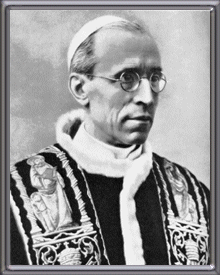 March 1939 was a time of high tension as Hitler, unsatisfied with his Munich
mouthful, was preparing to rend Europe. Faced with this situation the cardinals
quickly elected Eugenio Pacelli, the late Pope's capable and experienced
secretary of state.
March 1939 was a time of high tension as Hitler, unsatisfied with his Munich
mouthful, was preparing to rend Europe. Faced with this situation the cardinals
quickly elected Eugenio Pacelli, the late Pope's capable and experienced
secretary of state.
Eugenio Pacelli was born at Rome on March 2, 1876, of a family devoted to the
papal service. Eugenio, eager to become a priest, worked so hard at the
Capranica Seminary that his health gave way and he was forced to leave the
seminary. Leo XIII allowed young Pacelli to live at home while completing his
courses and in this way Pacelli reached ordination in 1899.
Eugenio began his priestly career with a combination of parish work and
professional study. He took a degree in Canon and Civil Law at the Apollinaris.
Cardinal Rampolla, on the watch for talent, took Pacelli into his department of
state. Pius X made him a monsignor and set him to work on the titanic task of
re-codifying canon law. During the First World War Pacelli gained valuable
experience helping Benedict XV and Cardinal Gaspari in their humane efforts.
In 1917 Benedict sent Pacelli as nuncio to Munich to forward the Pope's peace
plans. Although Pacelli managed to secure an interview with the Kaiser, nothing
came of it, and Germany went down in 1918. Red revolution swept Munich and
Pacelli got a bitter taste of life under the hammer and sickle. Several times
the Reds threatened him but he managed to calm them down. Once an automobile in
true gangster fashion roared by his house blasting it with machine-gun fire.
When the Weimar Republic was established, Benedict created a nunciature at
Berlin and sent Pacelli to be the first nuncio. He got along well with the
Germans and left with regret in 1929 to be made a cardinal. The next year he
succeeded the aged Gaspari as Secretary of State. Few popes have traveled as
widely as Pius XII, and he is the first pope to have visited the United States.
In the gloomy days of the Second World War Pius tried hard to keep a door
open to peace. On December 24, 1939, he gave the world a sane fivepoint peace
program. If he could not stop the war, at least he could and did relieve the
sufferings of the miserable millions of refugees and war victims. Pius called on
Catholics all over the world and especially in comparatively comfortable America
to share with the needy. Pius also did much to save Rome from destruction, but
he saved more than buildings. While Gestapo agents glared, Jews, refugees, and
all manner of hunted folk found safety in the tiny Papal State.
After the war Pius continued to stress the need for a just peace. A realist,
the Pope understood the thorny difficulties faced by the United Nations, but he
approved of it and encouraged all good works tending to foster international
understanding. As pastor of souls Pius keenly felt the need of modern man for
spiritual sustenance. To make it easier for people to attend Mass and receive
Holy Communion, Pius greatly relaxed the old rules governing the time of Mass
and the fast necessary to receive Holy Communion. He also simplified the
breviary.
Pius XII died on October 9, 1958. For suffering people of all faiths or no
faith he had been a true father.
Writings and Addresses of Pius XII
Excerpted from "Popes
Through the Ages" by Joseph Brusher, S.J.

